Abstract
The purpose of the present study was to compare omeprazole 20 mg once daily and ranitidine 150 mg twice daily in healing duodenal ulcers unhealed by previous treatment with cimetidine greater than or equal to 0.8 g or ranitidine greater than or equal to 0.3 g daily for at least six weeks. In a double blind multicentre trial, 151 patients were randomly assigned to either omeprazole or ranitidine. Clinical assessments and endoscopies were carried out at two and four weeks. Patients characteristics were similar in both groups. Statistical analysis (chi 2 test) did not show any significant difference in healing rate (p greater than 0.20) irrespective of the method of calculation. On an 'intent-to-treat' analysis (n = 151), healing was: omeprazole 46.6%, ranitidine 43.3% at day 15 and omeprazole 70.7%, ranitidine 68.4% at day 29; and among the patients who completed treatment, healing was: omeprazole 48.3%, ranitidine 46.3% at day 15 (n = 125; 95% confidence interval of the difference--17 to 21) and omeprazole 79.6%, ranitidine 75.4% at day 29 (n = 115; 95% confidence interval of the difference--13 to 21). After a further four weeks treatment with omeprazole, healing occurred in 16/20 (80%) who still had active disease at day 29. Patients on omeprazole and on ranitidine experienced similar decrease in day time and night time epigastric pain and in heartburn. Multivariate analysis (logistic regression) did not indicate any influence on age, sex, smoking and alcohol habits, previous drug administered, duodenitis and duodenal erosions on the healing rate. In this model, healing rate was not significantly influenced by previous treatment duration (p = 0.09 at day 15 and p greater than 0.2 at day 29) but was significantly influenced by ulcer size (p = 0.04 at day 15 and p = 0.02 at day 29). Forty one patients complained of adverse events: 19 on omeprazole (four trial withdrawals), 22 on ranitidine (three trial withdrawals).
Full text
PDF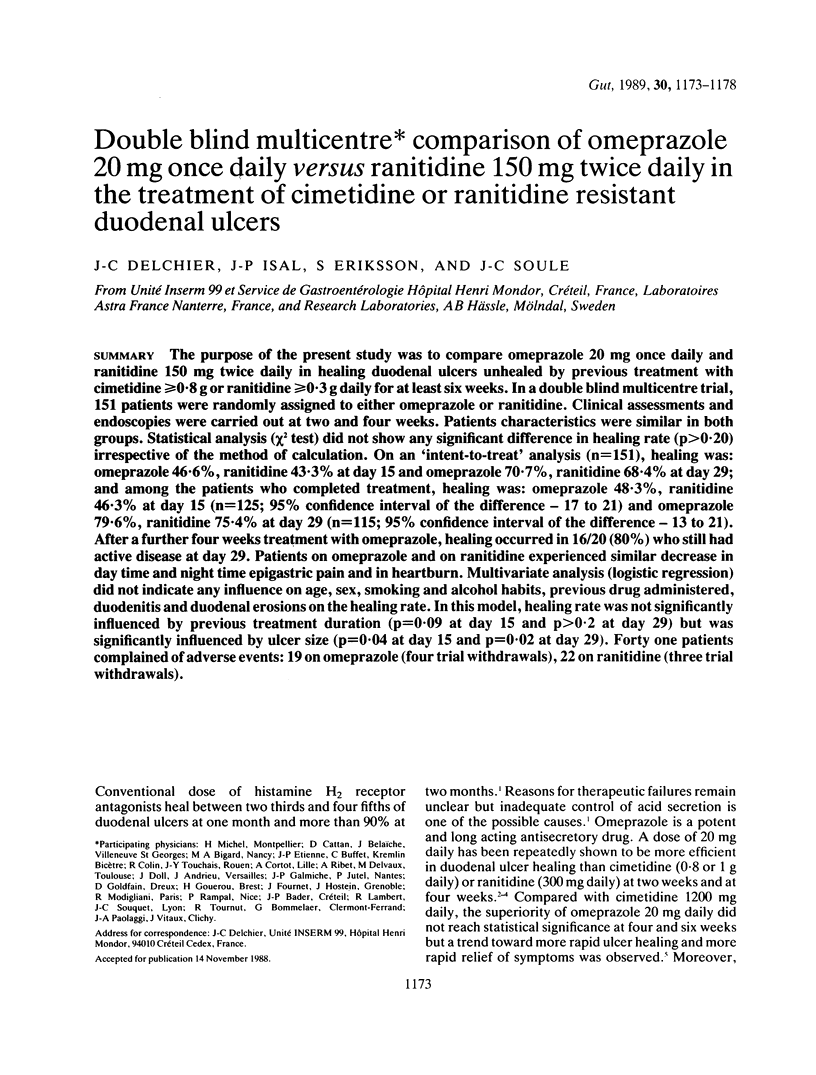
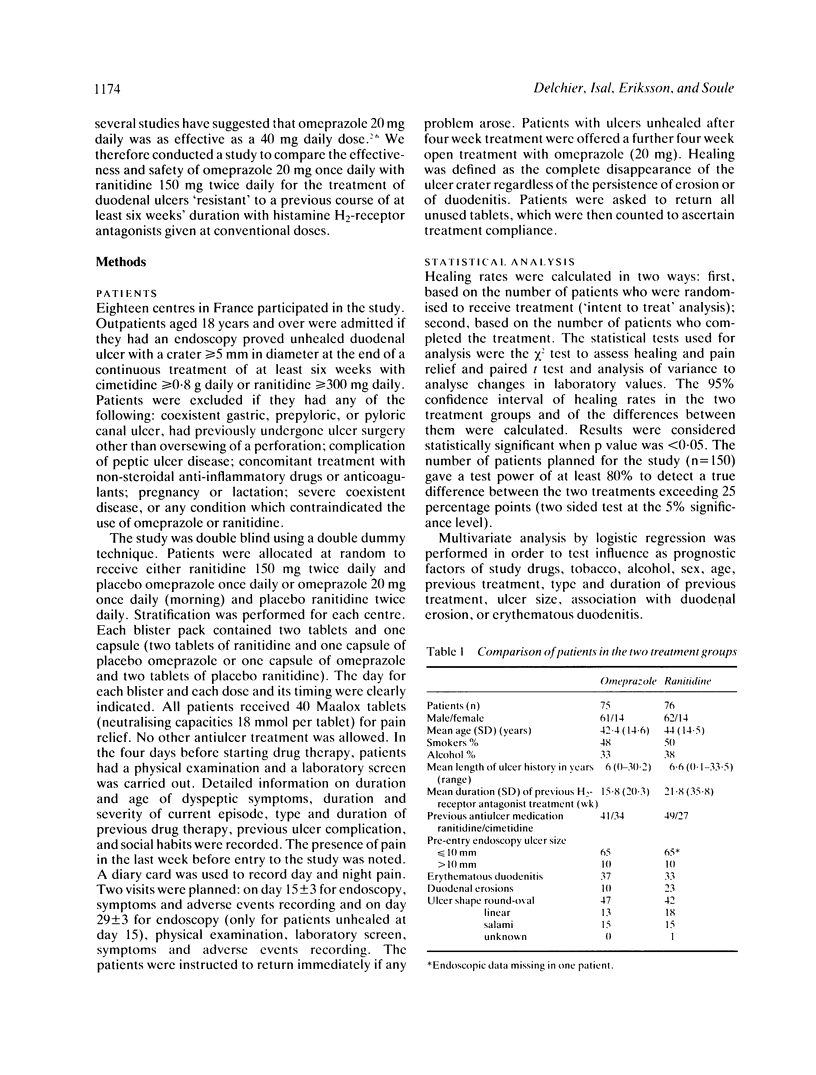
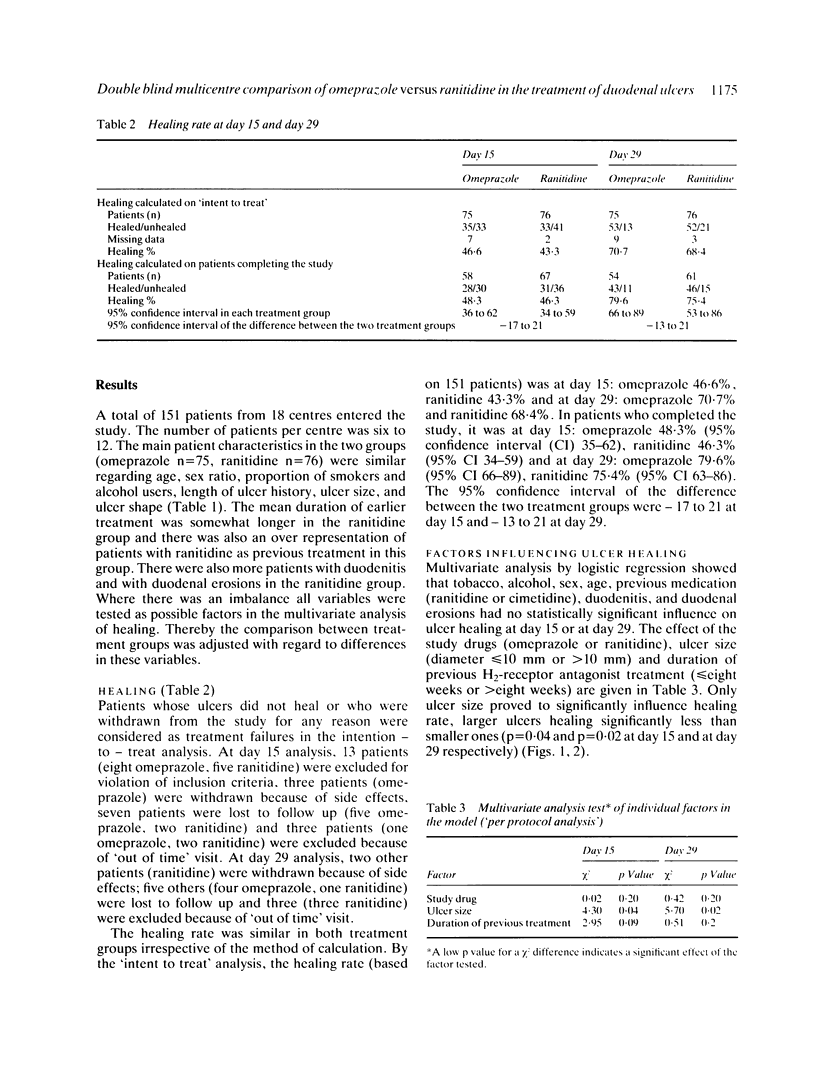
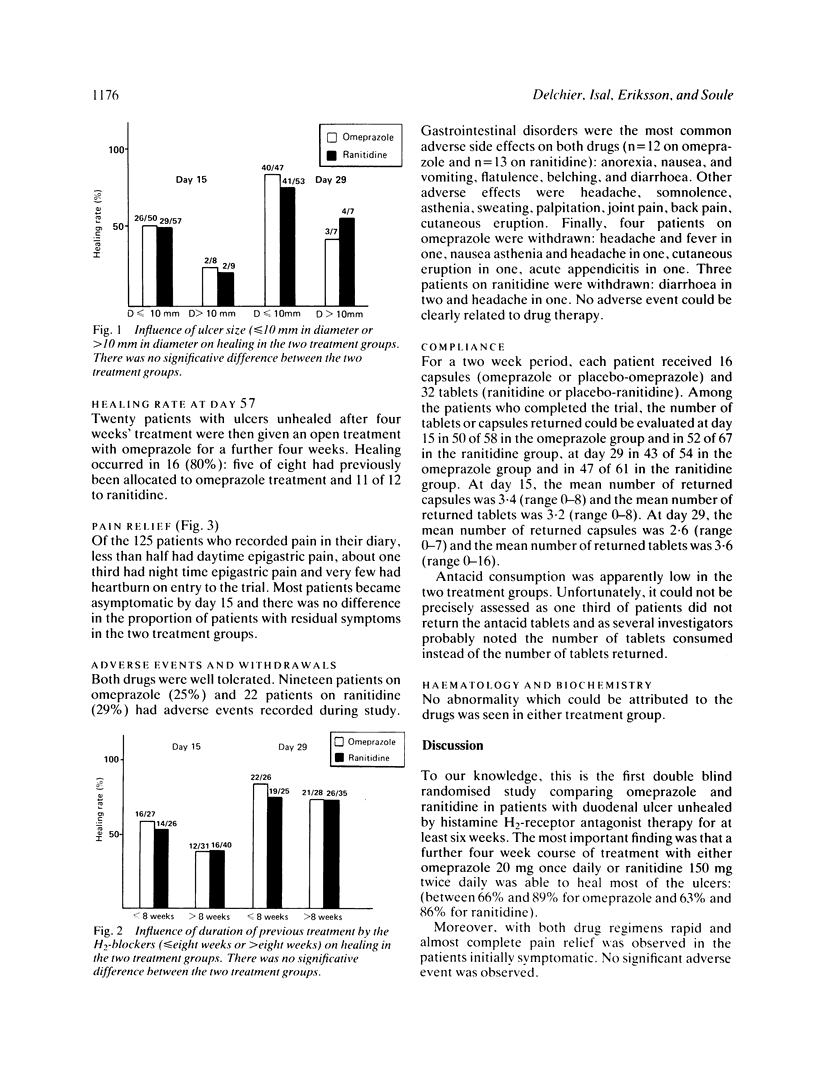
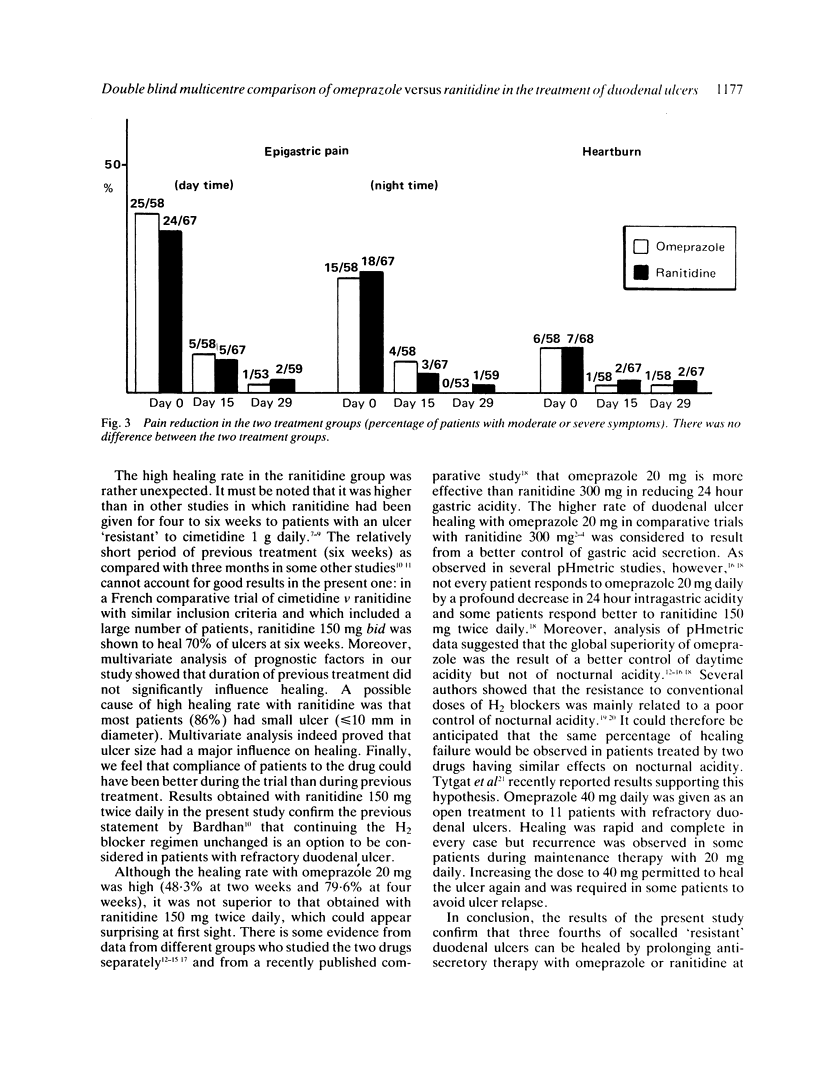
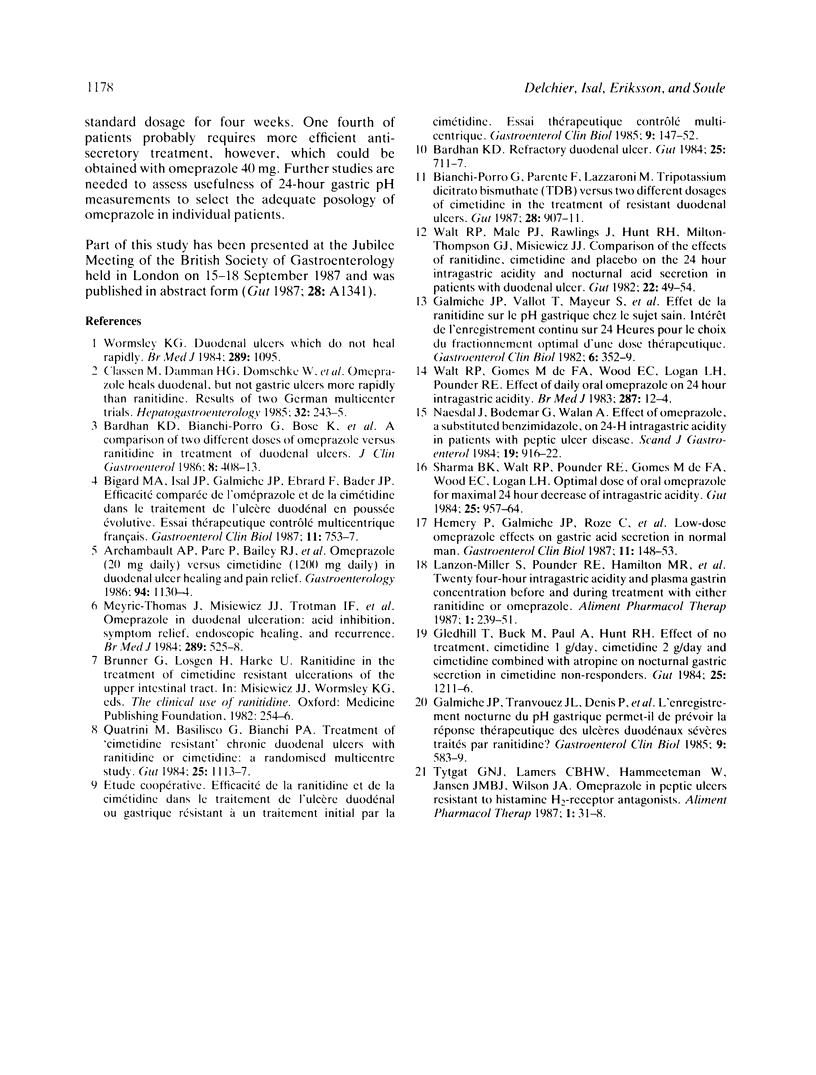
Selected References
These references are in PubMed. This may not be the complete list of references from this article.
- Archambault A. P., Pare P., Bailey R. J., Navert H., Williams C. N., Freeman H. J., Baker S. J., Marcon N. E., Hunt R. H., Sutherland L. Omeprazole (20 mg daily) versus cimetidine (1200 mg daily) in duodenal ulcer healing and pain relief. Gastroenterology. 1988 May;94(5 Pt 1):1130–1134. doi: 10.1016/0016-5085(88)90003-0. [DOI] [PubMed] [Google Scholar]
- Bardhan K. D., Bianchi Porro G., Bose K., Daly M., Hinchliffe R. F., Jonsson E., Lazzaroni M., Naesdal J., Rikner L., Walan A. A comparison of two different doses of omeprazole versus ranitidine in treatment of duodenal ulcers. J Clin Gastroenterol. 1986 Aug;8(4):408–413. doi: 10.1097/00004836-198608000-00005. [DOI] [PubMed] [Google Scholar]
- Bianchi Porro G., Parente F., Lazzaroni M. Tripotassium dicitrato bismuthate (TDB) versus two different dosages of cimetidine in the treatment of resistant duodenal ulcers. Gut. 1987 Jul;28(7):907–911. doi: 10.1136/gut.28.7.907. [DOI] [PMC free article] [PubMed] [Google Scholar]
- Galmiche J. P., Tranvouez J. L., Denis P., N'Djitoyap C., Guillard J. F., Lehur P. A., Colin R. L'enregistrement nocturne du pH gastrique permet-il de prévoir la réponse thérapeutique des ulcères duodénaux sévères traités par la ranitidine? Gastroenterol Clin Biol. 1985 Aug-Sep;9(8-9):583–589. [PubMed] [Google Scholar]
- Gledhill T., Buck M., Hunt R. H. Effect of no treatment, cimetidine 1 g/day, cimetidine 2 g/day and cimetidine combined with atropine on nocturnal gastric secretion in cimetidine non-responders. Gut. 1984 Nov;25(11):1211–1216. doi: 10.1136/gut.25.11.1211. [DOI] [PMC free article] [PubMed] [Google Scholar]
- Naesdal J., Bodemar G., Walan A. Effect of omeprazole, a substituted benzimidazole, on 24-h intragastric acidity in patients with peptic ulcer disease. Scand J Gastroenterol. 1984 Oct;19(7):916–922. [PubMed] [Google Scholar]
- Quatrini M., Basilisco G., Bianchi P. A. Treatment of 'cimetidine-resistant' chronic duodenal ulcers with ranitidine or cimetidine: a randomised multicentre study. Gut. 1984 Oct;25(10):1113–1117. doi: 10.1136/gut.25.10.1113. [DOI] [PMC free article] [PubMed] [Google Scholar]
- Sharma B. K., Walt R. P., Pounder R. E., Gomes M. D., Wood E. C., Logan L. H. Optimal dose of oral omeprazole for maximal 24 hour decrease of intragastric acidity. Gut. 1984 Sep;25(9):957–964. doi: 10.1136/gut.25.9.957. [DOI] [PMC free article] [PubMed] [Google Scholar]
- Walt R. P., Gomes M. D., Wood E. C., Logan L. H., Pounder R. E. Effect of daily oral omeprazole on 24 hour intragastric acidity. Br Med J (Clin Res Ed) 1983 Jul 2;287(6384):12–14. doi: 10.1136/bmj.287.6384.12. [DOI] [PMC free article] [PubMed] [Google Scholar]
- Walt R. P., Male P. J., Rawlings J., Hunt R. H., Milton-Thompson G. J., Misiewicz J. J. Comparison of the effects of ranitidine, cimetidine and placebo on the 24 hour intragastric acidity and nocturnal acid secretion in patients with duodenal ulcer. Gut. 1981 Jan;22(1):49–54. doi: 10.1136/gut.22.1.49. [DOI] [PMC free article] [PubMed] [Google Scholar]


